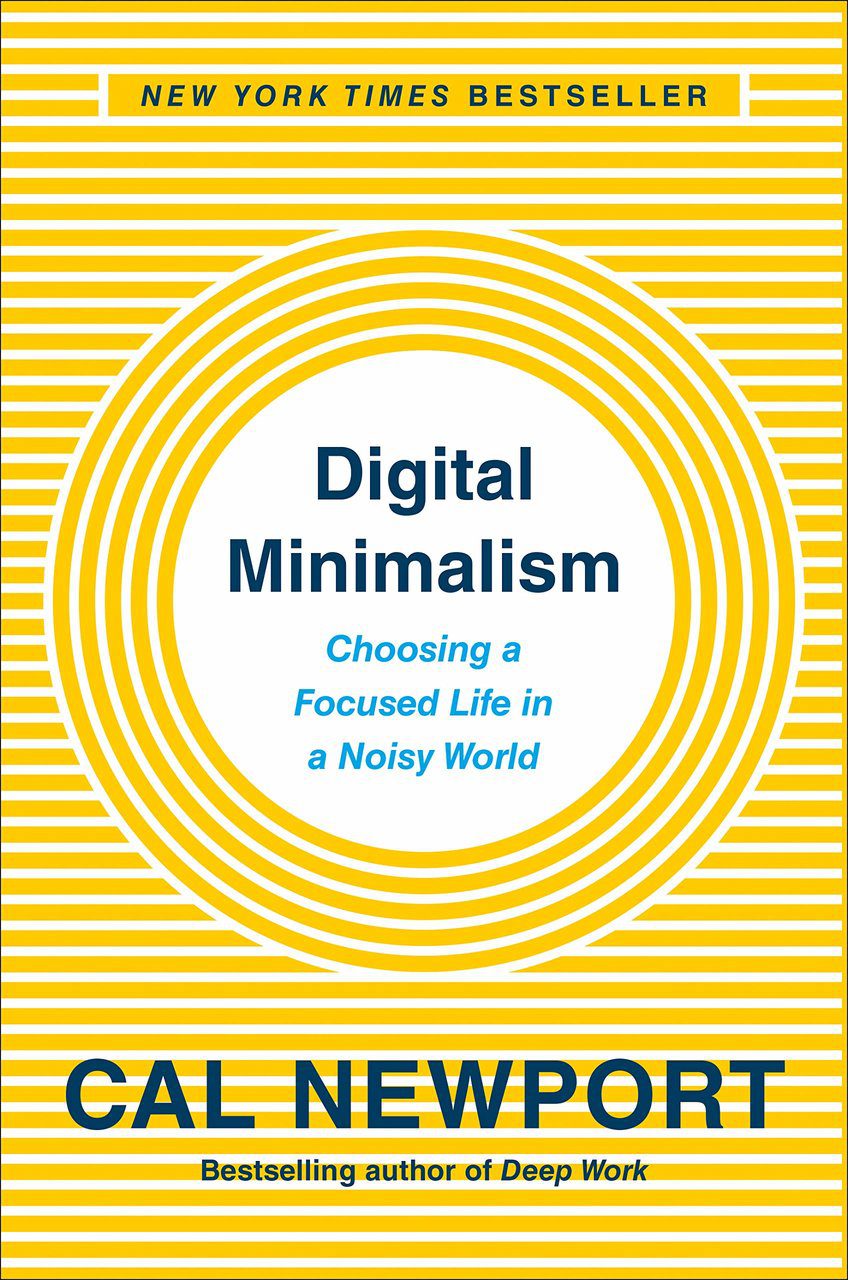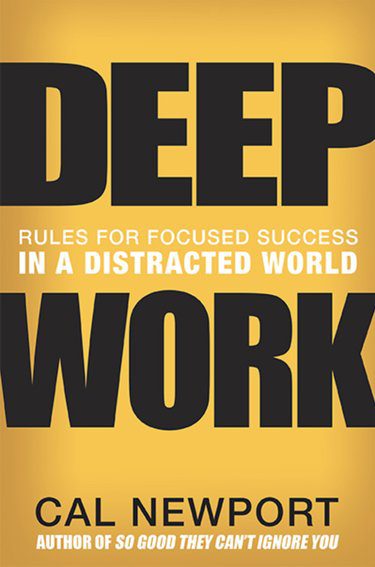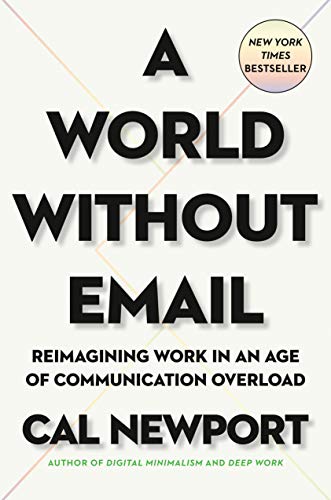Cal Newport is one of my favorite productivity writer. He is the writer that has shaped my view the most about the constructive use of the internet and social media. His books Digital Minimalism, Deep Work, and a world without E-mail were very impactful, thought-provoking and they all made me make some drastic changes. I believe the worth of a great book is determined by the change in behavior and the action that you take after reading the book.
Some of the actions have taken after reading Cal Newport books include deactivating Facebook, deleting Twitter, deleting all posts on Linkedin, stopped using Instant Messengers (such as Whatsapp, Facebook Messenger, et al), Deactivating Instagram. I still check social media daily after work on my desktop to view my favorite comedy skits, Nigerian Musicians that inspire me, and some random stuff. What the insights from reading the Newport books have done for me, is that I am more mindful of how I use the internet, schedule my activities and use my free time to focus on things that matter to me such as personal growth and development, exercise, self-care, content creation et al.
On average, we all have 30,000 days to be alive and that is if we are that lucky. One-third of that time would be spent sleeping, another one-third would be spent working, commuting, social media, and entertainment. The prognosis of life is Death and we are all living on borrowed times. Learning and mastering the use of your limited time is one of the most important skill to learn in our ever overwhelmed, stressed and burned out world.
Here are some great insights have learned from reading Cal Newport Books:

Digital Minimalism
A philosophy of technology use in which you focus your online time on a small number of carefully selected and optimized activities that strongly support things you value, and then happily miss out on everything else.
The Digital Minimalist:
- If a new technology offers little more than a minor diversion or trivial convenience, the minimalist will ignore it. Even when a new technology promises to support something the minimalist values, it must still pass a stricter test:
Is this the best way to use technology to support this value? If the answer is no, the minimalist will set to work trying to optimize the tech, or search out a better option.
- By working backward from their deep values to their technology choices, digital minimalists transform these innovations from a source of distraction into tools to support a life well lived. By doing so, they break the spell that has made so many people feel like they’re losing control to their screens.
- They tend to be incredibly wary of low-value activities that can clutter up their time and attention and end up hurting more than they help. Minimalists don’t mind missing out on small things; what worries them much more is diminishing the large things they already know for sure make a good life good.
Deep Work: Professional activities performed in a state of distraction-free concentration that push your cognitive capabilities to their limit. These efforts create new value, improve your skill, and are hard to replicate.
In Deep Work: Rules for Focused Success in a Distracted World, Newport argued that the knowledge sector was undervaluing concentration. While the ability to rapidly communicate using digital messages is useful, the frequent disruptions created by this behavior also make it hard to focus, which has a bigger impact on our ability to produce valuable output than we may have realized

Deep Work vs Shallow Work
- Deep Work: Professional activities performed in a state of distraction-free concentration that push your cognitive capabilities to their limit. These efforts create new value, improve your skill, and are hard to replicate.
- Shallow Work: Noncognitively demanding, logistical-style tasks, often performed while distracted. These efforts tend to not create much new value in the world and are easy to replicate
Shallow Work: Noncognitively demanding, logistical-style tasks, often performed while distracted. These efforts tend to not create much new value in the world and are easy to replicate.
The Deep Work Hypothesis
The ability to perform deep work is becoming increasingly rare at exactly the same time it is becoming increasingly valuable in our economy. As a consequence, the few who cultivate this skill, and then make it the core of their working life, will thrive.
Strategies for Deep Work
- The key to developing a deep work habit is to move beyond good intentions and add routines and rituals to your working life designed to minimize the amount of your limited willpower necessary to transition into and maintain a state of unbroken concentration.
- Rule #1: Work Deeply – Ritualize your Work Flow
- Rule #2 – Embrace Boredom – Don’t Take Breaks from Distraction. Instead Take Breaks from Focus.
- Rule #3: Quit Social Media – Apply the Law of the Vital Few to Your Internet Habits
- Rule #4: Drain the Shallows – Schedule Every Minute of Your Day, Quantify the Depth of Every Activity, Become hard to Reach,

World Without E-Mail
According to Radicati’s Group Email Statistics Report, 2015-2019, the average worker was sending and receiving 126 business emails per day, which works out to about one message every four minutes.
A widely accepted premise of modern knowledge work is that email saved us: transforming stodgy, old-fashioned offices, filled with secretaries scribbling phone messages and paper memos delivered from mail carts, into something sleeker and more efficient. According to this premise, if you feel overwhelmed by tools like email or instant messenger, it’s because your personal habits are sloppy: you need to batch your inbox checks, and turn off your notifications, and write clearer subject lines! If inbox overload gets really bad, then maybe your organization as a whole needs to tweak their “norms” around issues like response time expectations.
The underlying value of the constant electronic communication that defines modern work, however, is never questioned, as this would be hopelessly reactionary and nostalgic, like pining for the lost days of horse transport or the romance of candlelight.
The Hyperactive Hive Mind : A workflow centered around ongoing conversation fueled by unstructured and unscheduled messages delivered through digital communication tools like email and instant messenger services.
What if email didn’t save knowledge work but instead accidentally traded minor conveniences for a major drag on real productivity (not frantic busyness, but actual results), leading to slower economic growth over the past two decades? What if our problems with these tools don’t come from easily fixable bad habits and loose norms, but instead from the way they dramatically and unexpectedly changed the very nature of how we work? What if Dark Tuesday, in other words, was not a disaster, but instead a preview of how the most innovative executives and entrepreneurs will be organizing their work in the very near future?
As email spread through the professional world in the 1980s and 1990s it introduced something novel: low-friction communication at scale. With this new tool, the cost in terms of time and social capital to communicate with anyone related to your job plummeted from significant to almost nothing.
Social media, E-mail, Instant Messaging and othe Internet enabled tools have been transformational for most people that can use it effectively and in moderation. As Newport adviced in Digital Minimalism, ask yourself: Is this the best way to use technology to support this value?. The technology is supposed to be a tool and not the one using us through divided attention, information overload, constant notification which inherently makes us focus on shallow work instead of deep work. One of the major culprit of information overload is e-mail, as we constantly check it because it is ubiquitous with modern day work. These tools are great but should be used in moderation.
All the Best in your quest to get Better. Don’t Settle: Live with Passion.



1 Comment
Pingback: On Information Overload. | Lanre Dahunsi